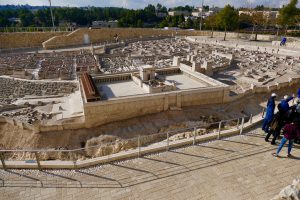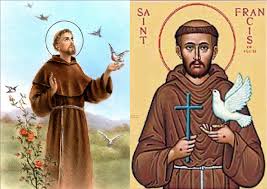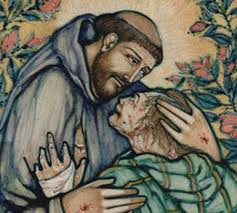Lessons Learned on the Way: Memorial – St Francis of Assisi
(Neh 2:1-8; Ps 137; Lk 9:57-62)
******************************************
Have you ever been on a pilgrimage, or walked the El Camino de Santiago trail in France and Spain?

If so, you will find it easy to identify with today’s gospel. Whereas the other Synoptic gospels of Matthew and Mark have Jesus travelling back and forth, to and from Jerusalem, Luke’s gospel has Jesus setting out on one single-minded journey/pilgrimage to Jerusalem, with a focus on the Paschal Mystery that he would live out there.
Today’s gospel is rather unique and quite interesting in that it portrays three interactions with people along the way in which Jesus teaches three values of the reign of God that he came to inaugurate: poverty, having priorities and keeping a commitment. The memorial of St. Francis we celebrate today builds on these and adds the dimension of renewal, of rebuilding the Church.
To the first person on the way, Jesus teaches the value of simplicity, poverty and non-attachment to material things, for he himself had no place to lay his head. To the second, Jesus teaches the importance of having clear priorities in our lives, and that he must be front and center in terms of our priorities. To a third person, Jesus teaches the importance making a commitment to follow him and never turning back from the commitment.

Temple model, East wall
The first reading also involves a journey to Jerusalem. The prophet Nehemiah is given permission by the King to go to Judah to rebuild the temple that was destroyed by the Babylonians. That temple was the center of spiritual life for the Jews, where the glory of God was supposed to dwell in the holy city of God.

St. Francis is someone who lived out all these values: poverty, priorities, commitment and rebuilding the faith. Francesco Bernadone was born in Assisi, Italy, in 1811 or 1812. The son of a wealthy silk merchant, he grew up with all the material comforts and status that the wealth and standing of his family could provide. As a young solider and prisoner of war, he survived severe illness and gave up the idea of being a knight. His life changed one day when he met a beggar, with whom he shared his cloak, and followed an impulse to kiss a leper. That led him to try to follow Christ more closely.

Believing his call was to serve God and the poor, he chose the way of poverty. He began to pray more, and in 1206, received a message from the Lord that seemed to say, “Rebuild my Church.” He took it literally and started rebuilding an abandoned Church nearby. His father was upset with the course his life had taken and pressured him to engage in his dry goods business. That sparked the famous incident in which Francis made his choice to follow his heart, took off all his clothes, gave them to his father who disinherited him, and walked away naked.
In 1209, he understood that his work was to build up the Church, the people of God, by preaching repentance and the love of God to anyone who would listen – even the birds seemed to listen to him. Francis tried to live as simply as possible, following Lady Poverty. His zeal attracted others and thus began the religious order of the Franciscans. In 1210 a rule was approved, with the pope giving Francis and his companions a commission to be itinerant preachers. By 1219, they numbered 5,000.
The women who gathered around his example and ideals were led by his close friend and soulmate, St. Clare. An example of the practical piety and faith of Francis is the creation of the very first crèche in 1223 to mark Christmas, which led to the nativity scene we have today. He used this as an evangelizing tool to spark the imagination of his hearers. That same year, Francis was blessed with the stigmata resembling the wounds of the crucified Christ, a sign of extraordinary holiness.

Francis is also recognized as being the first to teach that the earth itself is holy. A deacon all his life, Francis’ visionary leadership inspired thousands to lead lives of poverty, simplicity and humble service, delighting in creation and consumed with love for Christ. He died a poor, humble and holy death at Assisi on October 3, 1226 and was canonized two years later. He is a popular saint who was loved by all, and to this day is revered as a universal saint and patron of Italy and ecologists. The prayer/hymn “Make Me a Channel of Your Peace” is attributed to him.
Fr. Thomas Rosica, of Salt and Light, comments: “Too often his message is lost and we reduce his role to that of a gentle, whimsical hippie who fed birds, smelled flowers and tamed wild wolves. He was and is the model of a radical Christian for all of us. Through his simplicity and humility, he preached the love of God. And yet as faithful as he was to this love, and to the constant need for conversion, he gives us the stark reminder that we remain unfaithful, unloving, unforgiving.”
As Richard Rohr puts it, “Francis taught his followers to own nothing so they would not be owned by their possessions. Francis experienced radical participation in God’s very life. Such practical knowing of his value and identity allowed Francis to let go of status, privilege, and wealth. Francis knew he was part of God’s plan, connected to creation and other beings, inherently in communion and in love.” Both Nehemiah and Francis were moved by the Spirit, took action and serve as great examples for us.
The Eucharist is a sacrament that Francis loved and from which he drew his strength to live poverty, make Jesus and care for creation a priority in his life, and remain faithful to his call to “rebuild the Church.”
May our celebration today both inspire and empower us to imitate both Nehemiah and St. Francis.



